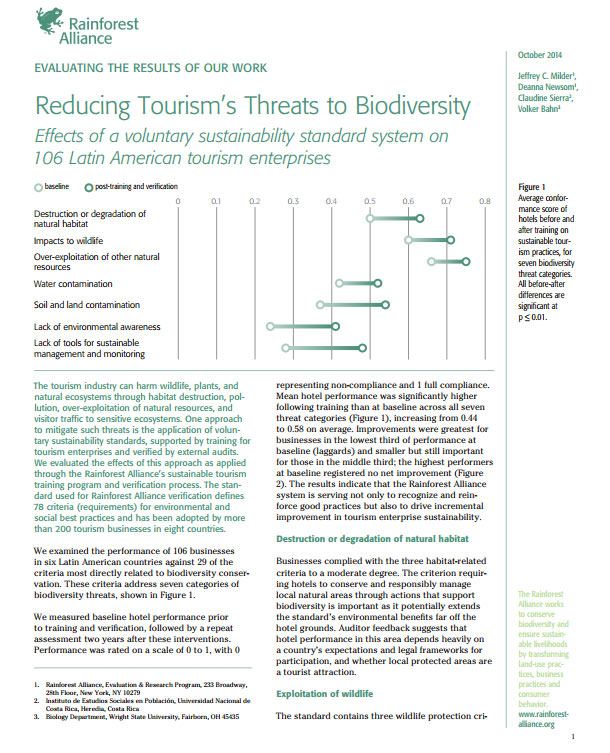Reducing Tourism’s Threats to Biodiversity
Effects of a voluntary sustainability standard system on 106 Latin American tourism enterprises
The tourism industry can harm wildlife, plants, and natural ecosystems through habitat destruction, pollution, over-exploitation of natural resources, and visitor traffic to sensitive ecosystems.
One approach to mitigate such threats is the application of voluntary sustainability standards, supported by training for tourism enterprises and verified by external audits. We evaluated the effects of this approach as applied through the Rainforest Alliance’s sustainable tourism training program and verification process. The standard used for Rainforest Alliance verification defines 78 criteria (requirements) for environmental and social best practices and has been adopted by more than 200 tourism businesses in eight countries.
The original paper was published in the Journal of Sustainable Tourism.
A Word from Oliver Hillel, United Nations Environment Programme
The Rainforest Alliance has been a long-time partner of the Secretariat of the Convention on Biological Diversity (CBD) in the common understanding that sustainable tourism can be a force for nature. The Rainforest Alliance has played a central and very constructive role in many UN and global platforms and cooperation forums in promoting the use of minimum standards for the operation of tourism businesses regarding impacts on the environment in general and on biodiversity.
Client and employee education, siting, design and construction guidelines for resort development, visitor management in sensitive ecosystems, operational standards for tourism facilities on landscaping, energy use, waste management and effluent control—all are critical for reducing damage to habitats and species, and many of those ideas are part of many regulatory mechanisms. However, a major challenge for the use of those instruments in tourism has proved to be their enforcement, which is often weak and in some countries is severely hampered by lack of commitment, external influences or insufficient capacity for inspection. With the RA’s work and their careful compilation of results, we have learned that it is essential to back these voluntary standards and codes with certification schemes that verify compliance by involving many stakeholders, and also by establishing accreditation programmes and making sure that certification is linked to significant contributions towards biodiversity.
We particularly appreciate the long-term contribution of the Rainforest Alliance’s data in this publication to further encourage Corporate Social Responsibility, business to business influences in the supply chain and promotion to consumers, including encouragement of sharing and feedback via social media. Finally, I’d also like to acknowledge the valuable contribution of the Rainforest Alliance to the Secretariat of the CBD’s recently review of the User’s Manual for the Convention’s Guidelines on Biodiversity and Tourism Development, which along with many other materials can be used to build capacity on certification among our 196 Parties.
Oliver Hillel
Programme Officer, Sustainable Tourism, Islands and Technical and Scientific Cooperation
Secretariat of the Convention on Biological Diversity
United Nations Environment Programme
